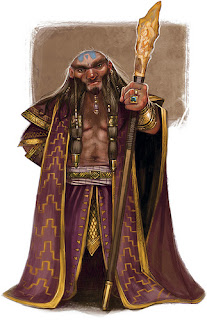Dwarven Spellforge: An Alternate Class for DCC
The dwarves of yore made mighty spells,
While hammers fell like ringing bells
In places deep, where dark things sleep,
In hollow halls beneath the fells.
Dwarven Spellsmith: An Alternate Class for DCC
It has happened in my games more than once where a level 0 character finds a book of spells and even succeeds at understanding the book to some degree or has a natural aptitude for magical phenomena then... lo and behold... they're a dwarf. Explaining race as class to a player often is part of why this sucks. They are confused and feel a little cheated. The worse part is knowing that dwarven magic is not only found in the central manuscripts of the genre i.e. Tolkien's work and it is even mentioned in DCC. The Runic Alphabet spell specifically mentions dwarven runes. I am fine saying that perhaps the secrets to dwarven spell craft was lost and now truly belongs to "the dwarves of yore," but when a dwarf character naturally has a knack for withcraft, what do we say? The PCs are kind of extraordinary individuals anyway, having become something a little above the common rabble by stepping out of level 0 into level 1. (Surviving might be a better word.)
In any case here is the class:
HD as Cleric (1d8)
Attack Bonus, Action Dice, Crit Die/Table, and Saves as Cleric
Spells Known: As Wizard
Weapon Training As Cleric
Spell Check: roll + Int + level
Infravision: As Dwarf
Underground Skills: As Dwarf
Spell Casting: A Spellsmith begins play knowing Read Magic and Runic Alphabet, Mortal as a part of his 4 starting spells. A Spellsmith may not actively cast any spell that is not Read Magic, Patron Bond, Invoke Patron, Wizard Staff, Sword Magic, or a Runic Alphabet Spell.
Spell Forging: While a Spellsmith may only actively cast a few spells, he may imbue spells that he knows into objects in order to cast them: specifically gems and pieces of jewelry.
In order to forge a spell, you will require a gem of piece of jewelry. The cost of this base material must be 50 x the level of the spell being forged.
Additional requirements are any that the spell asks and 100 gp x the level of the spell being cast in additional reagents.
Spell Forging takes 1 Week/Downtime Action per Spell Level.
Once the requisite time has passed, make the Spell Check for the desired spell. On a failure, the reagents are consumed but the process fails and all effects from Misfire or Corruption happen immediately. On a success, that result from the spell's table is now bound into the object and can be cast at the Spell Smith's whim so long as they hold the object in their hand or wear it on their person. Objects in bags must be held to be used.
These objects have only one charge that returns the next day, however there is a 1 in 20 chance that the object will be destroyed upon its use.
You can add charges to a Spell Forged item by spending 1 Downtime Action per Spell Level and spending 100 gp per Spell Level. At the end of which time, make a Spell Check. The result must equal or exceed the original result. On a failure the reagents are consumed but the process fails and all Misfire or Corruption happens immediately. On a success: 1d4 charges are added to the object. Spell Forged objects at level 4 or above cannot have charges added to them.
Spells like Sword Magic or Wizard Staff or any other spell that requires a full-blown ritual cannot be Spell Forged.
Dwarf Wizard Color | by scherer_jr used without permission



Comments
Post a Comment